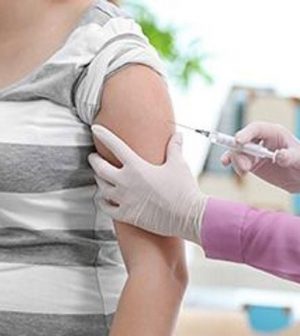- 10 Strategies to Overcome Insomnia
- Could Artificial Sweeteners Be Aging the Brain Faster?
- Techniques for Soothing Your Nervous System
- Does the Water in Your House Smell Funny? Here’s Why
- Can a Daily Dose of Apple Cider Vinegar Actually Aid Weight Loss?
- 6 Health Beverages That Can Actually Spike Your Blood Sugar
- Treatment Options for Social Anxiety Disorder
- Understanding the Connection Between Anxiety and Depression
- How Daily Prunes Can Influence Cholesterol and Inflammation
- When to Take B12 for Better Absorption and Energy
Sex of Fetus May Matter When COVID Strikes in Pregnancy

When a pregnant woman is infected with COVID-19, the sex of the fetus may influence immune system activity, researchers say.
The new study included 68 mothers-to-be. Thirty-eight developed COVID-19 during their third trimester, while 30 remained virus-free. In both groups, half of the fetuses were male and half were female.
In the infected women, male placentas had significantly higher levels of certain genes and proteins associated with increased immune activity compared to female placentas, the investigators found.
While this increased immune activity may provide male fetuses with better protection against coronavirus infection, the resulting inflammation could pose risks to the fetus while in the womb and to the child after birth, explained study senior author Dr. Andrea Edlow. She’s a maternal-fetal medicine specialist at Massachusetts General Hospital in Boston.
The researchers also found that infected pregnant women transferred significantly less immunity against the virus to male fetuses than to female fetuses, which could affect an infant’s risk of being infected with SARS-CoV-2.
“The sex of the fetus influenced both the mom’s ability to generate antibodies to COVID-19 and to transfer them to her baby,” Edlow said in a hospital news release.
This study was prompted by previous research showing that male adults, children and infants have a higher rate of coronavirus infection and develop more severe disease than females, the researchers noted.
The next step is to examine antibodies induced by the COVID-19 vaccine and see how those are affected by the timing of the vaccine as well as fetal sex.
“We want to know what happens to the placenta when moms are vaccinated against COVID-19 in each of the three trimesters and how fetal sex affects that response,” Edlow said.
The study was published Oct. 19 in the journal Science Translational Medicine.
More information
The U.S. Centers for Disease Control and Prevention has more on COVID-19 and pregnancy.
SOURCE: Massachusetts General Hospital, news release, Oct. 19, 2021
Source: HealthDay
Copyright © 2026 HealthDay. All rights reserved.










